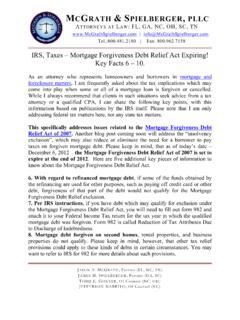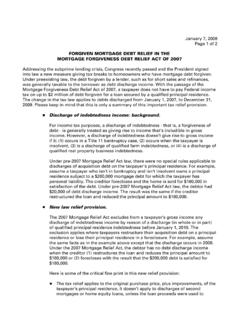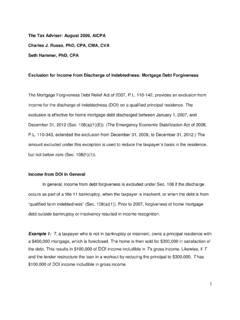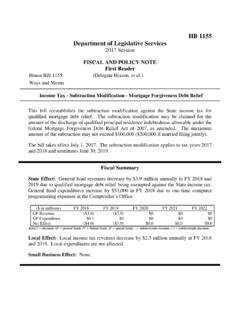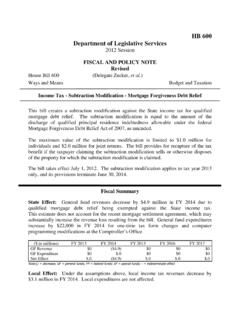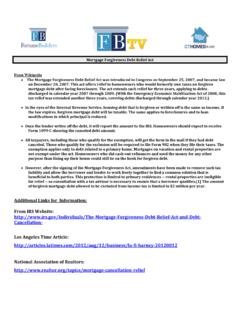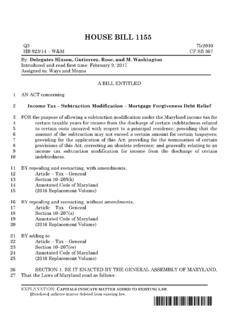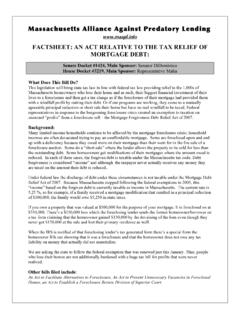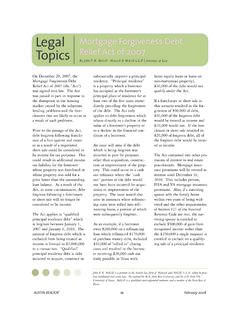Transcription of TAX LIABILITY OF FORGIVEN DEBT - nlslaw.net
1 TAX LIABILITY OF FORGIVEN mortgage debt OBLIGATION TO PAY TAXES ON CANCELED mortgage debt Lenders sometimes cancel or forgive a person s debt . While this relieves the debtor of an immediate financial stress, it often triggers a tax LIABILITY . Under the tax law, canceled debt is considered income to the debtor and is included as part of the debtor s income. Not only does this impact how much tax is paid, but can reduce deductions that are limited based on adjusted gross income. Is Cancellation of debt Income Always Taxable? Not always. There are some exceptions. The most common situations when cancellation of debt income is not taxable involve: Bankruptcy: Debts discharged through bankruptcy are not considered taxable income. Insolvency: If you are insolvent when the debt is cancelled, some or all of the cancelled debt may not be taxable to you. Certain farm debts: If you incurred the debt directly in operation of a farm, more than half your income from the prior three years was from farming, and the loan was owed to a person or agency regularly engaged in lending, your cancelled debt is generally not considered taxable income.
2 Non-recourse loans: A non-recourse loan is a loan for which the lender s only remedy in case of default is to repossess the property being financed or used as collateral. The lender cannot pursue you personally in case of default. forgiveness of a non-recourse loan resulting from a foreclosure does not result in cancellation of debt income. However, it may result in other tax consequences. Gifts, bequests, devises, and inheritances: You do not have income from canceled debt if the debt is canceled as a gift, bequest, devise, or inheritance. Q u a l i f i e d p r i n c i p a l r e s i d e n c e indebtedness: This is the exception created by the mortgage debt relief Act of 2007 and applied to most homeowners through December 31, 2013. How Do I Know If I Was Insolvent? You are insolvent when your total debts exceed the total fair market value of all of your assets. Assets include everything you own, , your car, house, condominium, furniture, life insurance policies, stocks, other investments, or your pension and other retirement accounts.
3 How Should I Report Information Related to Insolvency? Use Form 982, Reduction of Tax Attributes Due to Discharge of Indebtedness (and Section 1082 Basis Adjustment) to exclude canceled debt from income to the extent you were insolvent immediately before the cancel-lation. Foreclosures and Repossessions: If you do not make payments you owe on a loan secured by property, the lender may foreclose on the loan or repossess the property. The foreclosure or repossession is treated as a sale from which you may realize gain or loss. This is true even if you voluntarily return the property to the lender. If the outstanding loan balance was more than the FMV of the property and the lender cancels all or part of the remaining loan balance, you also may realize ordinary income from the cancellation of debt . You must report this income on your tax return unless certain exceptions or exclusions apply.
4 LAS VEGAS OFFICE Serving Clark, Lincoln, Nye and Esmeralda Counties 530 S. 6th Street Las Vegas, Nevada 89101 (702) 386-0404 / (866) 432-0404 FAX: (702) 388-1641 TDD: (702) 386-1059 RENO OFFICE Serving Northern Nevada 204 Marsh Ave., Ste. 101 Reno, NV 89509-1654 Phone (775) 284-3491 Toll Free (800) 323-8666 Fax (775) 284-3497 CARSON CITY OUTREACH OFFICE Open Tuesdays and Thursdays Only 209 N. Pratt Ave. Carson City, NV 89701 ELKO OFFICE 285 10th Street Elko, NV 89801 Phone (775) 753-5880 Fax (775) 753-5890 SENIOR LAW PROJECT OF NEVADA LEGAL SERVICES 1155 E. 9th Street, Ste. 25 Reno, NV 89512 Phone (775) 334-3050 Fax: (775) 334-3056 YERRINGTON OFFICE 720 S, Maub St. Unit A Yerington, NV 89447 775-463-1222 Fax: 775-463-1212 HELPLINE Serving all counties and assisting seniors in Nevada through the Senior Help-Line Phone (877) 693-2163 Fax: (775) 753-5890 LAWHELP WEBSITE The mission of Nevada Legal Services is to strengthen the community by ensuring fairness and providing equal access to justice for low-income Nevadans.
5 Whether you were personally liable for the debt (recourse debt ) or were not personally liable for the debt (nonrecourse debt ), Recourse debt If you abandon property that secures debt for which you are personally liable, you do not have gain or loss until the later foreclosure is completed. Nonrecourse debt If you abandon property that secures debt for which you are not personally liable, the abandonment is treated as a sale or exchange. The amount you realize on the abandonment is the amount of the nonrecourse debt . If the amount you realize is more than your adjusted basis, then you have a gain. If your adjusted basis is more then the amount you realize, then you have a loss. Loss from abandonment of business or investment property is deductible as a loss. Canceled debt If the abandoned property secures a debt for which you are personally liable and the debt is canceled, you will realize ordinary income equal to the canceled debt .
6 This income is separate from any amount realized from abandonment of the property. You must report this income on your return. Bankruptcy: debt cancelled in a title 11 bankruptcy case is not included in your income. A title 11 bankruptcy case includes chapters 7,11, and 13, but only if the debtor is under the jurisdiction of the court and the cancellation of the debt is granted by the court or occurs as a result of a plan approved by the court. How to Report the Bankruptcy Exclusion: To show that your debt was canceled in a bankruptcy case and is excluded from income, attach Form 982 to your federal attach Form 982 to your federal income tax return and check the box on line 1a. Lines 1b through 1e do not apply to a cancellation that occurs in a title 11 bankruptcy case. Enter the total amount of debt canceled in your title 11 bankruptcy case on line 2. You must also reduce your tax attributes in Part 11 of Form 982.
7 Qualified Real Property Business Indebtedness: You can elect to exclude canceled qualified real property business indebtedness from income. Qualified real property business indebtedness is debt (other than qualified farm debt ) that meets all of the following conditions. It was incurred or assumed in connection with real property used in a trade or business. It is secured by that real property. It was incurred or assumed before 1993, after 1992 if the debt is either (i) qualified acquisition indebtedness, or (ii) debt incurred to refinance qualified real property business debt incurred or assumed before 1993. It is debt to which you elect to apply these rules. Residential rental property generally qualifies as real property used in a trade or business unless you also use the dwelling as a home. mortgage forgiveness debt relief Act: This was passed in December 2007 by Congress. It allows taxpayers to exclude income from the discharge of debt on their principal residence.
8 debt reduced through mortgage restructuring, as well as mortgage debt FORGIVEN in connection with a foreclosure, qualifies for the relief . Borrower s Gain or Loss: You figure and report gain or loss from a foreclosure or repossession in the same way as gain or loss from a sale. The gain is the difference between the amount realized and your adjusted basis in the transferred property (amount realized minus adjusted basis). The loss is the difference between your adjusted basis in the transferred property and the amount realized (adjusted basis minus amount realized). Amount Realized and Ordinary Income on a Recourse debt : If you are personally liable for the debt , the amount realized on the foreclosure or repossession includes the smaller of: The outstanding debt immediately before the transfer reduced by any amount for which you remain personally liable immediately after the transfer, or The FMV of the transferred property.
9 The amount realized also includes any proceeds you received from the foreclosure sale. If the FMV of the transferred property is less than the total outstanding debt immediately before the transfer reduced by any amount for which you remain personally liable immediately after the transfer, the difference is ordinary income from the cancellation of debt . You must report this income on your return unless certain exceptions or exclusions apply. Abandonments: You abandon property when you voluntarily and permanently give up possession and use of the property with the intention of ending your ownership but without passing it on to anyone else. The tax consequences of abandonment of property that secures a debt depend on This provision applies to debt FORGIVEN in calendar years 2007 through 2013. Up to $2 million of FORGIVEN debt is eligible for this exclusion ($1 million if married filing separately).
10 The exclusion does not apply if the discharge is due to services performed for the lender or any other reason not directly related to a decline in the home s value or the taxpayer s financial condition. Hypothetical Examples Regarding the Cancellation of debt Income: Example 1: A homeowner has a house worth $200,000 but a mortgage debt of $350,000. The owner short sells the home for $200,000 and the bank forgives the remaining debt of $150,000. This FORGIVEN debt is initially treated as taxable income by the IRS. Now the principles of the insolvency clause can be applied. First, add up all debts and liabilities as well as your assets. The IRS expects you to list the mortgage debt as a LIABILITY and the fair market value of the house as an asset. If your total assets amount to $500,000 and your liabilities are $650,000, you have a $150,000 insolvency. In this scenario, the insolvency amount of $150,000 matches the FORGIVEN mortgage debt of $150,000 which makes the homeowner exempt from paying taxes on the FORGIVEN debt .
